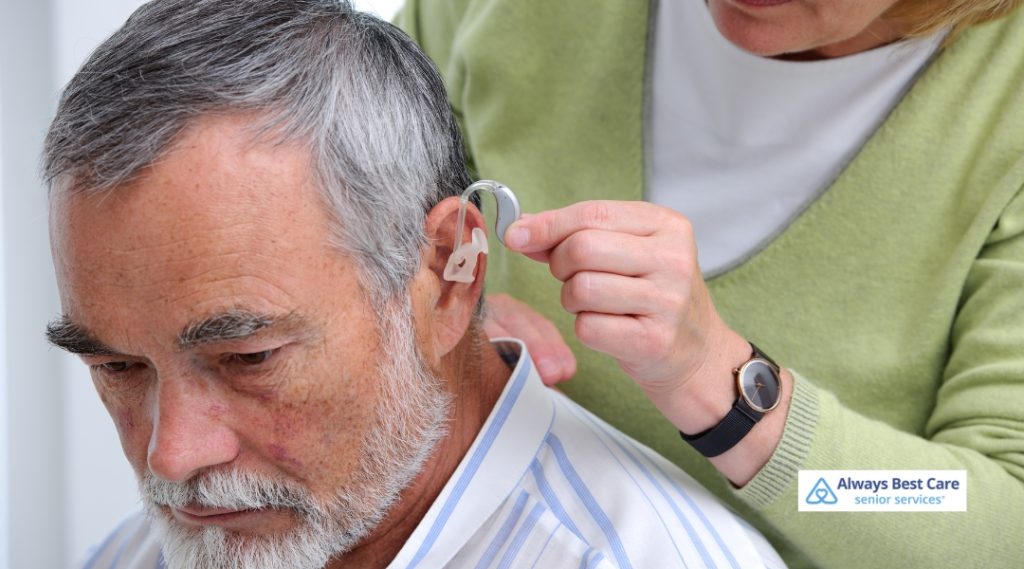How to Talk to Your Loved One About Hearing Loss Without Hurting Feelings

Hearing loss often creeps in quietly as we age.
But when you notice your senior loved one asking folks to repeat themselves or turning up the TV volume like there’s no tomorrow, it might be time for that heart-to-heart talk about their hearing health.
Starting this chat isn’t exactly a walk in the park; it’s delicate territory that calls for patience and understanding.
We’ll guide you through a kind and thoughtful way to help your loved one face their hearing challenges without feeling judged or isolated.
What you will learn:
- How to recognize common signs of hearing loss in your aging loved one and what they might mean.
- Supportive and respectful ways to begin the conversation about hearing challenges without causing embarrassment or frustration.
- How to gently address stigma and fears around hearing aids while encouraging next steps with kindness.
- The helpful role caregivers at Always Best Care of Lexington can play in supporting hearing health and daily communication.
Table of Contents
Recognizing the Signs of Hearing Loss
Before opening up that conversation, spotting subtle clues helps:
- Asking people to speak louder or repeat themselves.
- Turning up the television or radio volumes higher than usual.
- Seeming withdrawn from social gatherings.
- Complaining that others are mumbling or not speaking clearly.
- Missing parts of group conversations.
If any of these hit home, it might be time for us all to gently bring up what’s going on.

Approaching the Topic with Care
How you say something often matters more than what you say here.
Choose a calm moment when neither of you feels rushed or frustrated. Nobody likes being blindsided during heated moments! Express your concerns using “I” statements; they’re less likely to sound accusatory:
- “I’ve noticed it’s been tough keeping up during our phone calls lately.”
- “I worry that noisy places might be making things harder for you.”
The goal is simple: show love and concern, not criticism.
Reducing Stigma Around Hearing Loss
Lots of seniors avoid talking about hearing issues because they fear losing independence, or worse, looking frail.
Let’s shatter those myths!
Hearing loss is just another part of aging, much like needing glasses.
Today’s hearing aids? They’re sleek little gadgets designed for comfort and discretion, and they make social life much easier.
By normalizing this topic instead of tiptoeing around it, we can ease fears and encourage openness.

Encouraging Action Without Pressure
No one wants to feel pushed into anything uncomfortable. Instead:
- Suggest scheduling an evaluation with a doctor or audiologist together.
- Offering companionship for appointments makes the process less daunting.
- Give them space if they are hesitant; revisit kindly down the road.
Remind them how improving their hearing could brighten everyday moments rather than complicate life.
How Always Best Care Can Support Your Loved One’s Hearing Health
At Always Best Care of Lexington, our caregivers are trained not only in daily assistance but also in supporting sensory changes like hearing difficulties. We help by:
- Ensuring instructions are clear and understood.
- Keeping conversations engaging so no one feels left out.
- Assisting with appointment reminders and transportation.
We stand ready alongside your family every step so your loved one stays safe and socially connected despite any hearing hurdles.

Frequently Asked Questions (FAQ)
Q: How do I bring up my parents’ possible hearing loss without hurting feelings?
A: Pick a quiet moment free from distractions; use gentle “I” statements expressing concern rather than blame.
Q: What if my loved one denies having trouble?
A: Don’t push, offer information casually over time while showing empathy; sometimes acceptance takes days or weeks.
Q: Are modern hearing aids obvious? Will my parent feel self-conscious?
A: Not at all! Many models are discreet with great technology designed specifically for comfort; they won’t look bulky anymore.
Q: How can caregivers help once treatment starts?
A: They reinforce consistent use of devices, remind seniors about appointments/medications related to ear health & keep communication open.
Let’s Bring Back the Joy of Conversation!
If you’ve noticed signs of hearing loss in someone you love, starting the conversation with care can make all the difference. At Always Best Care of Lexington, we’re here to support your family with compassionate guidance and hands-on help.
If you’re wondering how we can help further support your family through this journey toward improved wellness at home, just reach out anytime!
Contact Always Best Care of Lexington at (859) 305-0060 to learn more and schedule your free consultation.





